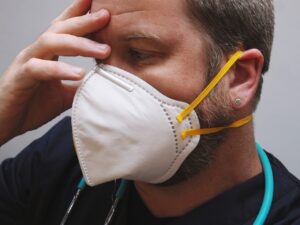Case Study – Moral Dimensions of Medical Negligence
Case Study – Moral Dimensions of Medical Negligence
 By Ryan Pferdehirt, D.Bioethics, HEC-C
By Ryan Pferdehirt, D.Bioethics, HEC-C
May 2022
Bioethics case study on the moral dimensions of medical negligence.
John is a freshly minted RN at a nursing home. He is a care provider for an 86- year-old male-identifying resident by the name of Lyle. Lyle is relatively healthy compared to most of the residents John cares for. He is fully “with it,” no noticeable dementia, and a very active elder. Lyle’s eyesight became poor from macular degeneration such that he gave up driving years ago, but he ambulates around the facility with relative ease. He dines with friends, attends social gatherings on a regular basis, and has become a favorite among the other residents and staff.
After a late lunch, John notices Lyle walking down the hallway to his room with a pronounced limp. Concerned, he asks Lyle if he’s okay. Nursing home residents are always at risk of falling, and Lyle is no exception despite his typical agility. “Oh, I’m fine,” Lyle replies. “Just bumped my leg on the table earlier. Or something. Just a clumsy old man. Anyway, I’m on my way to the bathroom. Kinda need to get there quick.” With a wry grin, he adds, “Don’t want to make a mess on the floor that you’d need to clean up after me!”
John asks if he wants assistance getting to the restroom. “It hurts a bit, but I’ll be fine. Thanks anyway,” Lyle replies. John is concerned, so he assesses the situation. Lyle grimaces from the pain, but appears fine otherwise, and the limp obviously hasn’t kept him from getting around. Given this, plus Lyle’s rebuffing the offer of assistance, John tells himself that it’s probably safe for Lyle to go to the restroom by himself. The nurse does remind Lyle to use the call bell if needed, that “I’ll be right around the corner.” John watches for a moment as Lyle shuffles down the hallway, wobbling just a bit also, as though dizzy.
Lyle is actually struggling more than he lets on, but who isn’t struggling in this place, if able to walk at all? “Lyle, are you sure you’re okay?” “I said I’m fine!” He seemed uncharacteristically testy, but everyone’s entitled to a bad day every so often. Lyle too. John shrugs and leaves quickly to attend to another patient in the nursing facility, silently grateful that Lyle didn’t want any help. There are so many others here who demand attention, so many medications to dispense and nursing assistants to supervise. John has been on duty for eight hours already, with four more to go, and he is exhausted. Staff turnovers and illnesses have left them short-staffed. Again. The stress of this job just never ends, making sleep difficult between multiple twelve-hour shifts back-to-back.
Fifteen minutes after John had encountered Lyle in the hallway, nursing home staff hear someone yelling out in pain. It’s Lyle. They rush to find him on the floor of his bathroom. There is blood everywhere from what appears to be a deep gash on the head. Lyle’s leg is at an awkward angle suggesting a hip fracture as well. While Lyle is being evaluated, he loses consciousness, and someone calls for an ambulance. EMTs arrive within minutes, work with nursing home staff to stop the hemorrhaging and protect his airway. They gently place Lyle on a stretcher and rush him to the ER a few miles away.
John was among those helping Lyle after his fall, and he feels a great deal of guilt for having left the resident to ambulate on his own given the red flags that he was at risk. Fall risk protocols at this facility are stringent, and this situation might have triggered a preventive response — had John been paying better attention. John is the only RN in the facility. He is the one who is supposed to model compliance for all other staff and enforce it also. Had he neglected his duty to care and lead? There were protocol triggers that John had noticed but then swept aside for what seemed valid reasons at the time. But were they? Had he been insufficiently attentive, overly distracted due to workload and stress?
Back on task, John files an incident report, honestly disclosing everything both in writing and in a verbal report to the facility administrator. He apologizes profusely for what happened. “I take full responsibility. It was my fault. I should have been paying more attention. Should have insisted on either helping Lyle or finding a CNA to do so. I feel so bad. If Lyle doesn’t recover, if he dies . . . . Oh, my God. Did I kill him?” John is distraught. His boss is worried too, both for the resident and for institutional liability. He assures his RN that it will be alright. “You did the right thing by disclosing, John. And we’ll need to do so to Lyle and his family, also, of course. But mistakes happen. Just finish up and then get home and get some rest. Hopefully, Lyle will be okay.”
What should be done?


